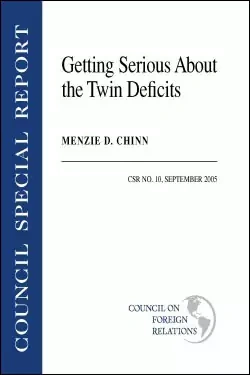
Getting Serious About the Twin Deficits

- Council Special Report
- Concise policy briefs that provide timely responses to developing crises or contributions to current policy dilemmas.
Overview
Twenty years ago, the United States was the world’s largest creditor nation, unsurpassed in its ownership of assets outside of its borders, even after deducting what foreigners owned inside its borders.
Yet over the past two decades, America has been transformed into the world’s largest debtor nation.
More on:
The focus of Getting Serious About the Twin Deficits by Menzie D. Chinn, a professor of public affairs and economics at the Universityof Wisconsinat Madison, who served as a senior economist for international financial issues on the president’s Council of Economic Advisers during the Clinton and George W. Bush administrations, is on the economic consequences of inaction with respect to the fiscal and current account deficits. “The longer we wait,” the report explains, “the greater the likelihood of a global financial and economic disruption. Even absent a discrete crisis, hewing to the current course raises the chances of stagnant economic growth, if not recession, in the future.” The report also shows that there may well be other ramifications.
“A striking cautionary note regarding America ’s current path is provided by Britain ’s loss of military and political primacy in the twentieth century; that development followed a shift from creditor to debtor status. Similarly, a prolonged decline in the dollar’s value and increasing indebtedness will erode America ’s dominance in political and security spheres. These trends threaten the dollar’s role as the global currency that facilitates international trade and finance, something the United States has gained immeasurably from over the years. A weaker dollar also reduces American leverage in international financial institutions such as the World Bank and International Monetary Fund (IMF). Finally, a diminished U.S. currency means that each dollar’s worth of military and development assistance has less impact at precisely the time when the nation faces the greatest challenges. Those threats we ignore at our own peril.”
Part of the Bernard and Irene Schwartz Series on American Competitiveness.
More on:
 Online Store
Online Store
